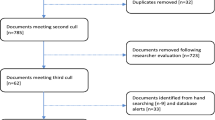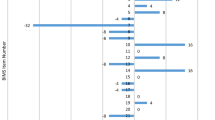Abstract
Despite the frequent criticisms directed toward them, in-service teacher training (INSET) programmes remain one of the most commonly used approaches for enhancing teachers’ professional development. This article reports on a study that examined the effects of a part-time masters of education INSET programme based in Central China. The main source of data was reflective papers written by 38 teacher participants; classroom observations and informal interviews also helped reveal the teachers’ perspectives on the programme. Whilst the programme was very popular, and had a variety of positive impacts on the teachers’ professional development, the programme paradigm involved several drawbacks. The results suggest that part-time INSET programmes for rural teachers should be supplemented by various other forms of teacher development activities to meet the dual goals of developing such programmes and providing professional development for teachers.
Similar content being viewed by others
References
Adams, R. S., & Chen, D. (1981). The process of educational innovation: An international perspective. London: Kogan Page.
Ayling, K. (1989). Splendid isolation: The experience of a long in-service course. British Journal of In-service Education, 15(2), 78–85.
Belay, A., Ghebreab, F., Ghebremichael, T., Ghebreselassie, A., Holmes, J., & White, G. (2007). How newly qualified primary teachers develop: A case study in rural Eritrea. International Journal of Educational Development, 27(6), 669–682.
Benson, P. (2010). Teacher education and teacher autonomy: Creating spaces for experimentation in secondary school English language teaching. Language Teaching Research, 14(3), 259–275.
Boadua, N. A. (2010). School-based continuing professional teacher development: A study of alternative teacher development initiative in the Eastern Cape. The African Symposium, 10(2), 75–83.
Burns, A., & Richards, J. C. (Eds.) (2009). The Cambridge guide to second language teacher education. New York: Cambridge University Press.
Cheng, L. Y., & Wang, H. (2004). Understanding professional challenges faced by Chinese teachers of English. TESL-EJ, 7(4), 1–14.
Chikoko, V. (2008). Developing teachers for rural education? Reflecting on the Second KwaZulu-Natal Department of Education Teacher Development Conference. Perspectives in Education, 26(4), 74–85.
Cooley, V. E. (1997). Technology: Building success through teacher empowerment. Educational Horizons, 75, 73–77.
Cope, P., Inglis, B., Riddell, S., & Sulhunt, O. (1992). The value of in-service degrees: Teachers’ long-term perceptions of the impact. British Journal of Educational Research, 8, 297–308.
Crabtree, B. F., & Miller, W. L. (Eds.). (1992). Doing qualitative research. Newbury Park, CA: Sage.
Davis, I. C. (2010). A teacher’s approach to the problems in teaching elementary science. School Science and Mathematics, 34(3), 275–283.
Diaz-Maggioli, G. H. (2003, August). Professional development for language teachers. ERIC Digest, EDO-FL-03-03.
Down, B., & Wooltorton, S. (2004). Beginning teaching in rural-remote schools: Implications for critical teacher development. Change: Transformations in Education, 71(1), 31–46.
Edwards, R. (2010). Teachers as action researchers. Modern English Teacher, 19(2), 64–66.
Farrell, T. (1999). Reflective practice in an EFL development group. System, 27, 157–172.
Grieve, A. M., & McGinley, B. P. (2010). Enhancing professionalism? Teachers’ voices on continuing professional development in Scotland. Teaching Education, 21(2), 171–184.
Grubis, S. (1985). A staff development program for teachers in northern native villages. The Canadian Journal of Native Studies, 5(1), 11–25.
Guskey, T. R. (2000). Evaluating professional development. Thousand Oaks, CA: Sage.
Hammer, P. C., Hughes, G., McClure, C., Reeves, C., & Salgado, D. (2005). Rural teacher recruitment and retention practices: A review of the research literature, national survey of rural superintendents, and case studies of programs in Virginia. Charleston, WV: Appalachia Educational Laboratory. http://www.edvantia.org/products/pdf/Rural%20Recruitment%20Report.pdf.
Helge, D. (1985). Planning staff development programs for rural teachers. Las Cruces, NM: ERIC Clearinghouse on Rural Education and Small Schools. http://www.ericdigests.org/pre-922/staff.htm.
Hofman, R., & Dijkstra, B. (2010). Effective teacher professionalization in networks? Teaching and Teacher Education, 26(4), 1031–1040.
Holly, M. L. (1989). Reflective writing and the spirit of inquiry. Cambridge Journal of Education, 19(1), 71–80.
Hu, L. (2007, Dec.). Policy actions on improvement of rural teacher education quality. Paper presented at the 11th UNESCO-APEID international conference, Reinventing Higher Education: Toward Participatory and Sustainable Development, Bangkok.
Huang, B. (2008). Teachers’ professional development in rural areas: New trends in teacher education research in China. Theory and Practice in Education, 1, 15–20.
Jeanpierre, B., Oberhauser, K., & Freeman, C. (2005). Characteristics of professional development that effect change in secondary science teachers’ classroom practices. Journal of Research in Science Teaching, 42(6), 668–698.
Johnson, K. E. (1996). The role of theory in second language teacher education. TESOL Quarterly, 30(4), 765–771.
Johnstone, R. (2004). Language teacher education. In A. Davies & C. Elder (Eds.), Handbook of applied linguistics (pp. 649–671). Oxford: Blackwell.
Kiely, R. (2009). Small answers to the big question: Learning from language programme evaluation. Language Teaching Research, 13(1), 99–116.
Lock, G., Reid, J., Green, B., Hastings, W., Cooper, M., & White, S. (2009). Researching rural-regional (teacher) education in Australia. Education in Rural Australia, 19(2), 31–44.
Manner, J. C., Rodriguez, D., & Godwin, L. (2009). Responsive professional development: Serving rural teachers of English language learners online. In I. Gibson, et al. (Eds.), Proceedings of society for information technology & teacher education international conference 2009 (pp. 2375–2379). Chesapeake, VA: AACE.
Marshall, C., & Rossman, G. B. (Eds.). (1995). Designing qualitative research (2nd ed.). Thousand Oaks, CA: Sage.
Miles, M. B., & Huberman, A. M. (Eds.). (1994). Qualitative data analysis: An expanded sourcebook. Newbury Park, CA: Sage.
Moreno, J. (2007). Do the initial and the continuous teachers’ professional development sufficiently prepare teachers to understand and cope with the complexities of today and tomorrow’s education? Journal of Educational Change, 8(2), 169–173.
Morrison, B. (2010). Teacher training in China and the role of teaching practice. Beijing: Tsing Hua University. http://sunzil.lib.hku.hk/hkj/view/45/4500089/pdf.
Newman, K. L., Samimy, K., & Romstedt, K. (2010). Developing a training program for secondary teachers of English language learners in Ohio. Theory into Practice, 49(2), 152–161.
Phelps, M. S., & Wright, J. D. (1986). Peer coaching: A staff development strategy for rural teachers. ERIC no. ED277513. http://eric.ed.gov/PDFS/ED277513.pdf.
Robinson, B. (2008). Using distance education and ICT to improve access, equity and quality in rural teachers’ professional development in western China. International Review of Research in Open and Distance Learning, 9(1), 1–17.
Rudduck, J. (1981). Making the most of the short in-service course. Schools Council Working Paper no. 71. London: Methuen Educational.
Salisbury, A. (1986). INSET school-based provision in mathematics and science in rural primary schools. International Journal of Mathematical Education in Science and Technology, 17(1), 85–94.
Schön, D. A. (1987). Educating the reflective practitioner. San Francisco, CA: Jossey-Bass.
Scott, J. (2000). Social network analysis: A handbook (2nd ed.). London: Sage.
Stevens, K. (1993). New communication technologies for teacher development in small rural schools in Australia. Rural Educator, 15(1), 11–13.
Valo, M. (2000). Experiencing work as a communications professional: Students’ reflections on their off-campus work practice. Higher Education, 39, 151–179.
Wang, J. T. (2006). Present situation of rural teacher development in Hubei Province and training strategies. Journal of Adult Education College of Hubei University, 24(3), 15–17.
Weitzenkemp, D. J., Howe, M. E., Steckelberg, A. L., & Radcliffe, R. (2003). The GOALS model: Rural teacher preparation institutions meeting the ideals of a PDS through educational technology. Contemporary Issues in Technology and Teacher Education, 2(4), 577–588.
Williams, R. (2005). The role of academic study in teachers’ professional development. Journal of In-service Education, 31(3), 455–469.
Wong, J. L. N., & Tsui, A. B. M. (2007). How do teachers view the effects of school-based in-service learning activities? A case study in China. Journal of Education for Teaching, 33(4), 457–470.
Yan, C. M. (2005). INSET participation and certification: A case study from China. Journal of In-Service Education, 31(3), 471–484.
Zhu, J. D., & Zhou, Z. (2009). Continuing education and training of teachers in rural areas based on mobile learning and mobile services. Paper presented at the 1st International Conference on Information Science and Engineering (ICISE), Nanjing, China, December 26–28, 2009.
Author information
Authors and Affiliations
Corresponding author
About this article
Cite this article
Yan, C., He, C. Enhancing part-time in-service teacher training programmes to facilitate rural teacher development in China. Prospects 41, 553–566 (2011). https://doi.org/10.1007/s11125-011-9211-9
Published:
Issue Date:
DOI: https://doi.org/10.1007/s11125-011-9211-9




